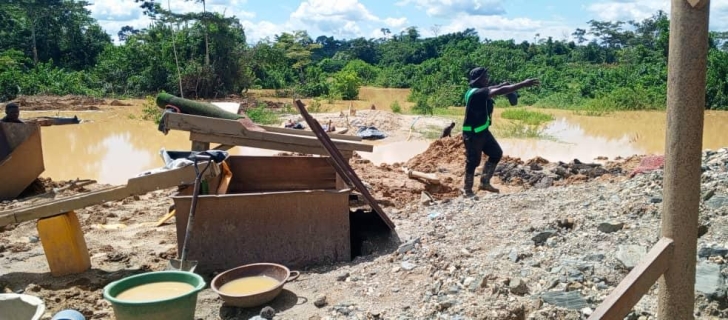
Political interference undermining military’s role in galamsey fight - Tonzua
A consultant in energy, environmental law, and sustainability, Jamal Tonzua has argued that granting the military full autonomy in the battle against galamsey is crucial for its success.
In a radio interview on Accra based Citi FM on Tuesday [October 15, 2024], Tonzua highlighted the importance of giving the Ghana Armed Forces the freedom to operate without political meddling.
He argued that, although the military can play a significant role in curbing illegal mining, their efforts have often been undermined by external interference “The military has never been given a free hand to fight this,”
Dr. Tonzua stated. “It’s always been a charade, window dressing…if we don’t let them work freely, it amounts to nothing.”
Dr Tonzua explained that under Ghana’s constitution, the military’s primary duty is to protect the country from external threats. He argued that while the military can assist in internal security matters, such as fighting galamsey, this should not overshadow their main role.
He called the current situation an “abuse of the constitution,” stating, “The military is meant to defend Ghana, and we are stretching their mandate.”
As a former assistant director of legal services for the Ghana Armed Forces, Dr. Tonzua revealed that the military’s ability to act decisively has been hindered by a lack of political will.
He cited instances where political figures interfered with military operations, even pressuring commanders to release detained illegal miners. “There have been cases where politicians gave orders to release certain people apprehended,” he said, pointing to the damage this interference does to the integrity of the military’s work.
Logistical challenges have further strained the military’s efforts. Dr Tonzua noted shortages in personnel, equipment, and transportation, along with inadequate surveillance tools like drones. “They needed more troopers, did they get them? They needed more low beds, were they provided? Were drones made available?” he questioned, highlighting the lack of support for the forces tasked with ending illegal mining.
Reflecting on past military operations, Dr. Tonzua acknowledged that while initial successes led to temporary halts in mining, there was no cohesive strategy to sustain those gains.
He argued that without strong political commitment and coordination between government agencies, the military’s efforts would remain mere “window dressing,” unable to bring lasting change. “We need all state institutions to work together transparently, so Ghanaians can track the progress,” he urged.
While recognising the military’s short-term role, Dr. Tonzua reiterated the importance of maintaining a balance that respects their constitutional mandate. “The military’s involvement is crucial, but it must be within a framework free from undue interference and in line with their core responsibilities,” he said.

